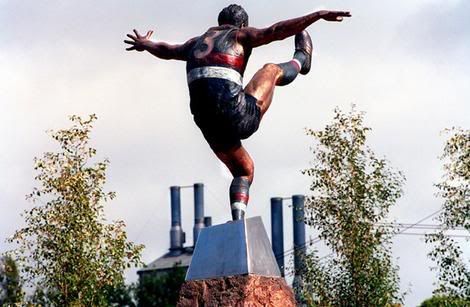Good article...
What's in a name? Plenty
The Age
Peter Hanlon | June 3, 2008
TOMORROW morning, at a not-so-long-ago decaying ground in Melbourne's inner-west, another step will be taken in a football club's rejuvenation. The club sits third on the AFL ladder, has just beaten the top team, and is enjoying its best start to a season ever.
These are heady times for this club, which is as proud of its history as rivals who boast of much more than just one day of ultimate glory. Given past struggles just to survive, it is a time to celebrate its very being. To rejoice in who it is.
It's a shame you have to scroll all the way down to the fine print to be reminded of this club's true name: Footscray.
It is more than 11 years since the administration of then-new president David Smorgon complemented its new off-field personnel with a change of name, playing venue, logo and club song, along with a new coach in Terry Wallace. At the time, the club's membership had dipped to just over 10,000 — lower than when it won the 1954 flag.
Then, the club was seeking a new beginning, having played its last game at Whitten Oval. As Smorgon said yesterday, few people leaving the ground after the Bulldogs had beaten West Coast that day would have believed that any heavy machinery moving in a decade later would have been charged with anything but demolition.
But that was then. The Doggies are now alive and well, with more than 27,000 members, continuing AFL largesse and the fruits of government funding materialising at their Whitten Oval home. The new Elite Learning Centre, to be opened tomorrow, is just one stage of a development that will bolster a football club and benefit a community.
Arguably, the time for a new beginning was right in 1996. But, as callers to talkback radio in recent days have proposed, maybe now is a good time to go back, while moving proudly forward. For that song to again begin: "Sons of the 'Scray".
Smorgon says a reversion from the trading name Western Bulldogs to Footscray Football Club is not on the agenda, "nowhere on the list of 100 things we've got to do". While he is president, he says, it will not happen.
He doesn't doubt that, to many, the name is important. "But I say to those people, we've moved on. We are the Western Bulldogs, and we're creating our history on the back of the Footscray Football Club history."
The change was made, Smorgon says, because of a belief that the club's identity was limited, that as Western Bulldogs they could better tap into sponsorship, build coteries and other support from the entire western region of Melbourne, with its 600,000-plus people. "We felt that Footscray was a restriction on growing our brand."
But football supporters do not see their club as a brand. They see it as players, people, a jumper. Something to love, that their mum and dad loved before them. Something to cheer and be cheered by. Something that gives them hope. Of no club is this truer than the Dogs.
Smorgon says the change has been a success, although not all that was hoped for has been achieved. Research shows 55% of members reside in the west, up from 50%. Given the migration to one of Melbourne's boom regions in the past decade, this can hardly be seen as endorsement of the "brand" name.
The transition certainly wasn't seamless, with premiership full-forward Jack Collins tackling Smorgon's administration at the time under the banner of "Footscray Forever".
A website, "Footscray Not Western Bulldogs", maintains the rage today, carrying an AFL ladder featuring Northern Blues, Eastern Hawks, Central Demons, Country Cats, etc. "Grab a street directory and try and find West Coast Eagles or Port Power in them, let alone Western Bulldogs," it barks, concluding that "the only west or western I want to know about is Scott West".
Smorgon is not concerned that, in a competition hell-bent on expansion, the word "Western" may soon be shared with another team, residing in the Sydney market that so tantalises the AFL.
As for North Melbourne's recent decision to embrace its identity and relegate Kangaroos to nickname status, he could not comprehend that club's thinking.
Yet surely the notion of catching support with an all-encompassing name sells short those 27,000-plus members, who proudly see their club just as it is styled in the last line of their song: "The team of the mighty west." People who would be proud to again call their club Footscray, no matter where they live.
 Thanks: 0
Thanks: 0
 Likes: 0
Likes: 0
Results 1 to 15 of 25
Thread: What's in a name? Plenty
Threaded View
-
03-06-2008, 01:38 AM #1
What's in a name? Plenty







 Reply With Quote
Reply With Quote